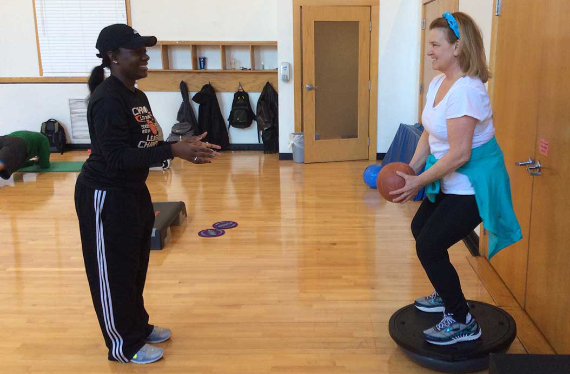If you’ve ever thought about possibly working in healthcare, it would be natural for your mind to immediately conjure images of doctors and nurses; after all, they are the most visible healthcare careers that many of us see in our daily lives.
But it’s important to realize that those are not the only career options available to those who would one day like to work in the healthcare industry. In fact, many different careers fall under the umbrella term of “health sciences,” each of which could be an alternative career path for an individual who wishes to work in healthcare but does not wish to be a doctor or nurse.
Below, we define the term “health sciences” in both a general and academic sense of the phrase. We also highlight a number of common and rewarding careers and job titles that those who earn a degree in the health sciences often go on to hold.
What is Health Sciences?
Health sciences is a term that is used to speak broadly to a range of career paths and professions which revolve around healthcare. This includes everyone from doctors and nurses to occupational therapists, physical therapists, speech language pathologists, dental hygienists, and the countless other individuals who provide services which empower humans to live healthy and meaningful lives.
That being said, in the academic sense, health sciences is often used to refer to specific degrees or fields of study which prepare students for various roles in the healthcare industry.
For example, Regis College offers a Bachelor of Science in Health Sciences. This program combines both a general knowledge of the US healthcare system as well as a focus on a specific area of allied health in order to prepare students for a related career. Graduates go on to work in a range of settings, including in hospitals, long-term care facilities, doctor’s offices, laboratories, health clinics, and government offices, with a wide variety of titles.
At the same time, the School of Health Sciences offers a number of other degrees, each of which is designed to prepare students for a more specific career path.
Top Health Science Careers in the Merrimack Valley
1. Dental Hygienist
Dental hygienists perform a range of functions specifically designed to help keep dental offices operating smoothly. These specific tasks include everything from reviewing dental and health history of patients to conducting dental cleanings, taking dental X-rays, applying preventative care, educating patients about proper dental hygiene practices, and more.
As noted above, according to the US Bureau of Labor Statistics (BLS) the average dental hygienist earns approximately $76,220 each year, or roughly $36.65 per hour. Demand for dental hygienists is expected to grow at approximately six percent annually, which is faster than the demand growth for all occupations.
While a degree in health sciences can help to prepare you for a career as a dental hygienist, there are also specific degrees that can prepare you for the job as well, such as an associate’s or bachelor’s degree in dental hygiene.
2. Diagnostic Medical Sonographer
Diagnostic medical sonographers are skilled technicians who use high frequency sound waves to create images of the body. These images allow doctors and other healthcare professionals to learn about their patients, and can inform the diagnostic process. Sonographers can practice in a variety of specialties, including:
- Abdominal
- Breast
- Pediatrics
- Musculoskeletal
- Obstetrics and gynecology
- Vascular
Per the BLS, the median salary for a diagnostic medical sonographer is approximately $74,320 annually, or $35.73 per hour. This pay can vary substantially depending on the specific industry that you work in, with those working in outpatient care centers earning some of the highest compensation.
While a degree in health sciences can help to prepare you for a career as a medical sonographer, there are also specific degrees that can prepare you for the job as well. The Bachelor of Science in Diagnostic Medical Sonography offered by Regis College is one example.
3. Medical Technologist
Medical technologists, also called clinical laboratory technologists or technicians, perform a wide range of duties in a healthcare setting such as a hospital, doctor’s office, or medical lab. These duties include collecting and analyzing samples of body fluids, tissues, and other substances, amongst other duties.
As noted above, the BLS reports that the average medical technologist will earn approximately $53,120 each year, or roughly $25.54 per hour. The field is expected to grow at a rate of approximately seven percent annually from 2019 to 2029, which is nearly double the rate of growth for all occupations.
4. Health Educator and Community Health Workers
Health educators are those professionals who work to teach the public about behaviors which promote health and wellness. Examples include the topics of proper diet and exercise. Community health workers, on the other hand, work to collect and analyze data about the health of specific patient populations or communities. These insights often become the basis for public policy and public health initiative.
Health educators and community health workers are often discussed in relation with each other, as their areas of focus overlap.
According to PayScale, the average annual pay for health educators and community health workers in Massachusetts is approximately $50,000, or $25.91 per hour.
5. Occupational Therapy Assistant
Occupational therapy assistants are an integral part of the occupational therapy team. As such, they perform a range of tasks designed to support OT patients and facilitate the work of the occupational therapist. This involves ensuring that patients are properly completing the activities outlined in their treatment plans, and may even include helping to generate a treatment plan.
It is worth noting that, in order to become a full occupational therapist, you will need to earn a Master of Science in Occupational Therapy (MSOT) from an accredited program, and then pass the NBCOT exam. Earning a related undergraduate degree, such as a bachelor’s degree in health sciences, is often viewed as a prerequisite for enrolling in such a graduate program.
According to PayScale, the average occupational therapy assistant earns approximately $61,390 per year, or roughly $29.50 per hour.
Top Employers in the Merrimack Valley
Throughout the country and state of Massachusetts, there is incredible demand for individuals with the skills necessary to work in the health sciences. On a local level, there are a number of employers specific to the Merrimack Valley that are almost always hiring, including:
- Community Care Alliance
- Elliot Health System
- Fresenius Medical Care North America
- New England Pediatric Care
- Pfizer
- Raytheon
Working in Health Sciences
Earning your health sciences degree is an excellent way of exploring the various careers in healthcare which may interest you, and is typically enough to gain work in one of the entry-level positions listed above. That being said, advancing in a particular field will often require a master’s degree or other form of graduate education specifically tied to that field.
For example, while a Bachelor of Science in Health Sciences may help you break into the field of occupational therapy as an occupational therapy assistant, you will need to earn a Master of Science in Occupational Therapy (MSOT) in order to become a full occupational therapist.
Due to this fact, earning a BS in Health Sciences is often viewed as just the first step on an individual’s journey toward working in healthcare.
For More Information




